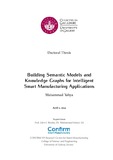| dc.description.abstract | Industry 4.0 (I4.0) (or smart manufacturing) is a new era in the industrial
revolution that emphasises machine connectivity, automation, and data an alytics. This revolution has led to the creation of production lines that
produce machine-generated process data through sensors, leading to in creased efficiency and productivity. Ontologies have been used to integrate
the data from various formats into a single, unified form. However, most of
these ontologies have overstudied the essential concepts related to the I4.0
production line that are of key importance in building a knowledge graph
for smart manufacturing. This thesis aims to propose a framework that
can be adopted by any I4.0 production line with minimal modifications to
build its knowledge graph. The framework has been tested using realistic
data from two separate industrial use cases.
The existing ontologies in the manufacturing domain have limited depth
and expressiveness due to their scope and purpose mapping for applica tion specificity. As a result, this hinders the stakeholders in constructing
their knowledge graphs. The First Contribution of this thesis is to address
this challenge of application specificity. We provide Reference Generalized
Ontological Model (RGOM) based on the Reference Architecture Model for
I4.0.
The I4.0-based Knowledge Graphs, or Knowledge Graph (KG) have
been receiving significant attention over the past few years, and many re searchers are involved in building them in the form of manufacturing pro duction lines KG. However, most of the time, they have limitations when
applied to a specific use case. These use cases are based on two possibili ties: (1) if the researchers are using synthetic data, or (2) if the use case is
coming from an industry based on their private company data. The Sec ond Contribution of this thesis is to address this challenge related to data
being real or synthetic. We provide one of the first datasets based on the re alistic data collected from a football production line. We have proposed an
automated approach for mapping the data into RGOM to build a KG that is
made publicly available for experiments by the I4.0 community. Moreover, the dataset enables the demonstration of RGOM adaptability with minimal
modification in a manufacturing environment.
The current techniques used to build KGs focus on integrating data
from heterogeneous sources and often result in missing links between the
entities. As a consequence of the missing links within the KGs, they cannot
be exploited by the applications. We observe some missing links in the
developed football production line KG. The Third Contribution of this
thesis is to solve this challenge related to missing links. We address the
challenge of KG missing links by utilizing state-of-the-art KG embedding
models, namely ComplEx, DistMult, TransE, ConvKB, and ConvE, on football
manufacturing production line datasets.
The current ontologies are not publicly available and therefore cannot
be accessed by other users for reuse purposes. Such a lack of availabil ity often requires that users build their ontologies from scratch, is a time consuming task. The Fourth Contribution of this thesis is the employ ment of a use case from Bosch to determine how RGOM can serve as a do main manufacturing ontology, facilitating integration among various data
sources. In relation to this, we developed the Resistance Spot Welding Ontol ogy (RSWO) and align it with the RGOM.
This research has introduced the Reference Generalised Ontological
Model (RGOM) as a flexible framework for manufacturing production lines,
which can be applied to any production line with minimal modifications. It
can also be employed as a manufacturing domain-level ontology by align ing ontologies at the application level for enhanced interoperability. The
results on the benchmark dataset (I40KG) have demonstrated more effi cient production processes and improved overall performance. Further more, the process of predicting missing links in the I40KG indicated that
translational models demonstrated better performance on manufacturing based KGs compared to neural network models. This distinction can be
attributed to the hierarchical structure of the KGs. | en_IE |


